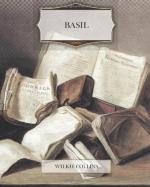On the first day, the party assembled for dinner comprised the merchant’s daughter, my mother, an old lady who had once been her governess, and had always lived with her since her marriage, the new Lord, the Abbe, my father, and my uncle. When dinner was announced, the peer advanced in new-blown dignity, to offer his arm as a matter of course to my mother. My father’s pale face flushed crimson in a moment. He touched the magnificent merchant-lord on the arm, and pointed significantly, with a low bow, towards the decrepit old lady who had once been my mother’s governess. Then walking to the other end of the room, where the penniless Abbe was looking over a book in a corner, he gravely and courteously led the little, deformed, limping language-master, clad in a long, threadbare, black coat, up to my mother (whose shoulder the Abbe’s head hardly reached), held the door open for them to pass out first, with his own hand; politely invited the new nobleman, who stood half-paralysed between confusion and astonishment, to follow with the tottering old lady on his arm; and then returned to lead the peer’s daughter down to dinner himself. He only resumed his wonted expression and manner, when he had seen the little Abbe—the squalid, half-starved representative of mighty barons of the olden time—seated at the highest place of the table by my mother’s side.
It was by such accidental circumstances as these that you discovered how far he was proud. He never boasted of his ancestors; he never even spoke of them, except when he was questioned on the subject; but he never forgot them. They were the very breath of his life; the deities of his social worship: the family treasures to be held precious beyond all lands and all wealth, all ambitions and all glories, by his children and his children’s children to the end of their race.
In home-life he performed his duties towards his family honourably, delicately, and kindly. I believe in his own way he loved us all; but we, his descendants, had to share his heart with his ancestors—we were his household property as well as his children. Every fair liberty was given to us; every fair indulgence was granted to us. He never displayed any suspicion, or any undue severity. We were taught by his direction, that to disgrace our family, either by word or action, was the one fatal crime which could never be forgotten and never be pardoned. We were formed, under his superintendence, in principles of religion, honour, and industry; and the rest was left to our own moral sense, to our own comprehension of the duties and privileges of our station. There was no one point in his conduct towards any of us that we could complain of; and yet there was something always incomplete in our domestic relations.




